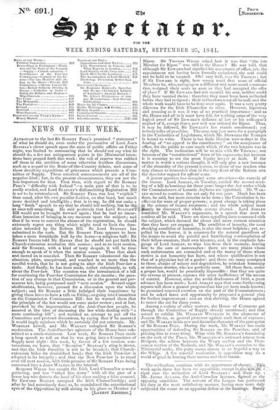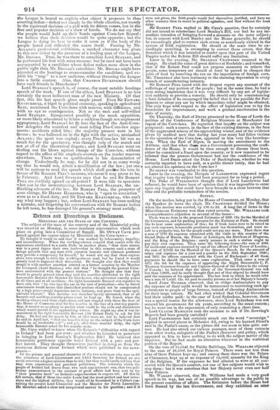cipal case the reelection of Lord STANLEY ; and, there
agt Mr. JAMES ACLAND, the Anti-Corn-law lecturer, figured as the ' opposing candidate. The servant of the League has performed his duty in the most satisfactory manner, having once more duly subjected the cause to an apparent defeat at the hustings. Surely
the League is bound to explain what object it proposes in thus courting defeat—defeat not simply in the whole election, not merely in the equivocal decision of a poll with its driven voters, but in the free and popular decision of a show of hands. We do not say that the people would hold up their hands against Corn-law Repeal ; we believe that their decision would be quite opposite ; but the League is doing its best to make it seem as if the body of the people hated and ridiculed the cause itself. Passing by Mr. ACLAND'S professional exhibition, a marked character was given to this new defeat by the presence of a leading man of the League, 3dr. BROOKS. True, he was there to catechize Lord STANLEY, and he performed his feat with some success; but he need not have been accompanied by a candidate whose defeat makes more show in the public sight than Mr. BitooRs's catechism: Mr. Bacioxs might have attended at the hustings to cross-examine the candidate, and ex- hibit his "trap" to a new audience, without thrusting the League into a futile contest. Alas, that CHANDOS BUCKLNGHAM should have such friends in Manchester !
Lord STANLEY'S speech is, of course, the most notable hustings speech of the week. If one of the ablest, Lord STANLEY is no less .certainly the most indiscreet man of the new Ministry. Of that fact, this his last speech gives ample proof. Even Sir EDWARD KNATCHBULL, a bigot in political economy, speaking in agricultural Bent, mentioned the Corn-laws with reserve, with diffidence, and with an eye to contingencies. Not so the rash and self-willed Lord STANLEY. Exasperated possibly at the mock opposition, or more likely stimulated by it into a reckless though not unpleasant oppugnancy, Lord STANLEY let fly into the face of the Anti-Corn- law delegates the roundest and most telling Pro-Corn-law argu- ments: accidents aided him ; the majority present were in his favour ; he was hallooed on in the fight with the active, unabashed ACLAND ; the sport was capital; every Pro-Corn-law hit was so much fun for the spectators, who thought only of the match and not at all of the theoretical dispute ; and Lord STANLEY went on dealing out his blows against change of the Corn-law, without regard to the effect of his emphatic avowals on the tender reserves elsewhere. There was no qualification in his denunciation of change. Undoubtedly he may, for he did not in so many words say that he would not, admit a modification of the law ; yet one,. will be curious to read the speech which shall prefiece his vote in favour of Sir ROBERT PEEL'S measure, whatever it may prove to be, in February. And Lord STANLEY says that he and Sir ROBERT FEEL are cordially agreed on all points ! It were idle to speculate -what can be the understanding between Lord STANLEY, the un- ilinching advocate of the law, Sir ROBERT PEEL, the promoter of some change, Sir HENRY HARDiptiGE, who is "open to conviction" even as to a fixed-duty, and Sir EDWARD KNATCHBULL, who can't say what may happen ; but, unless Lord STANLEY has been making a mistake, and forgetting his conversations with Sir ROBERT before he left town, he has damaged his general's strategy most awfully.



























